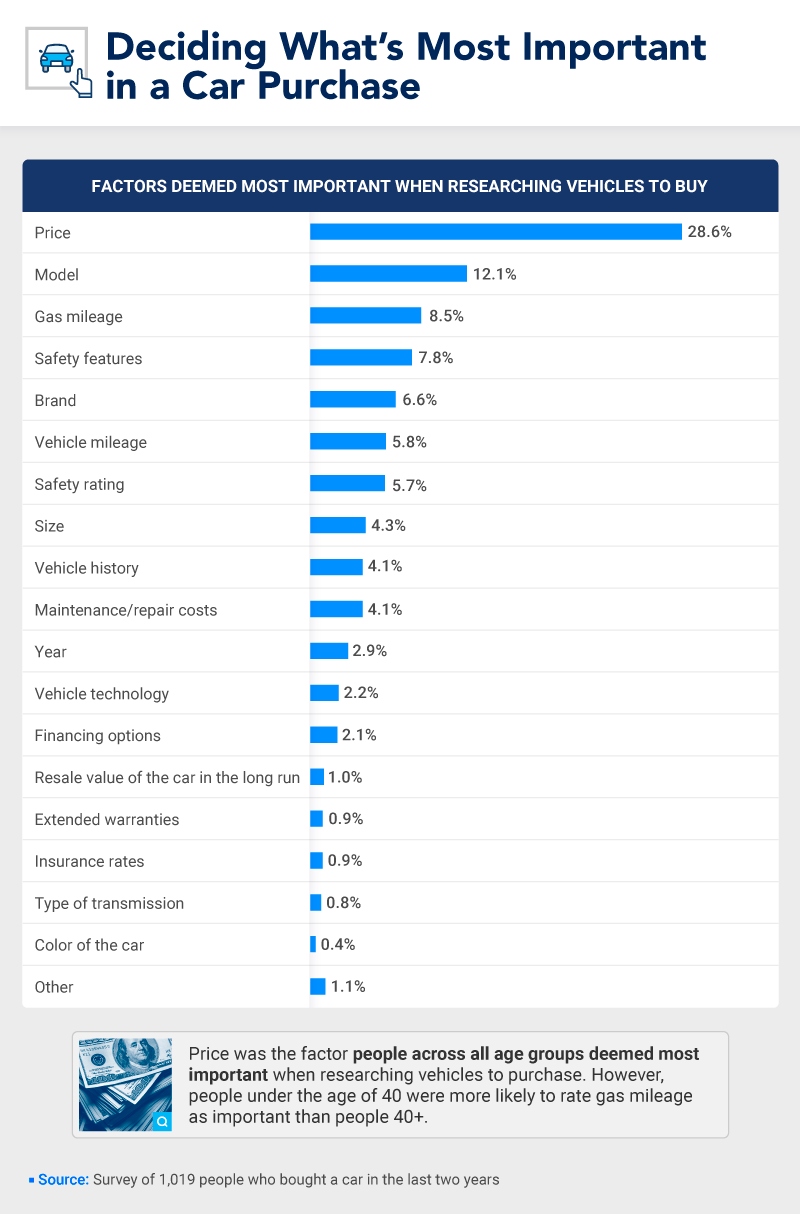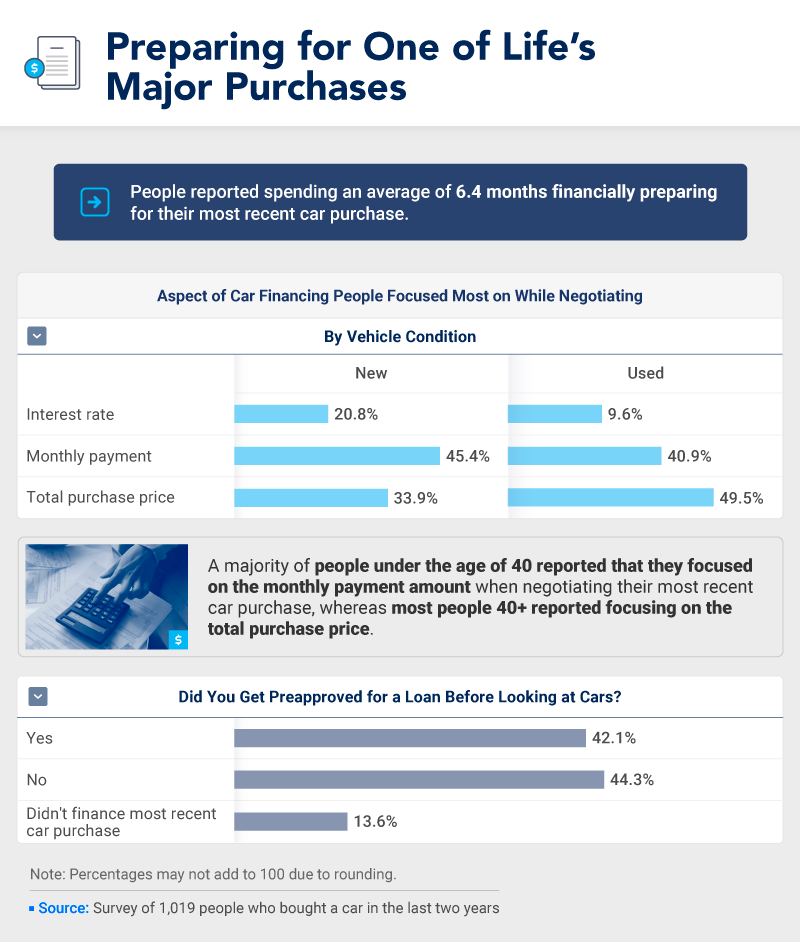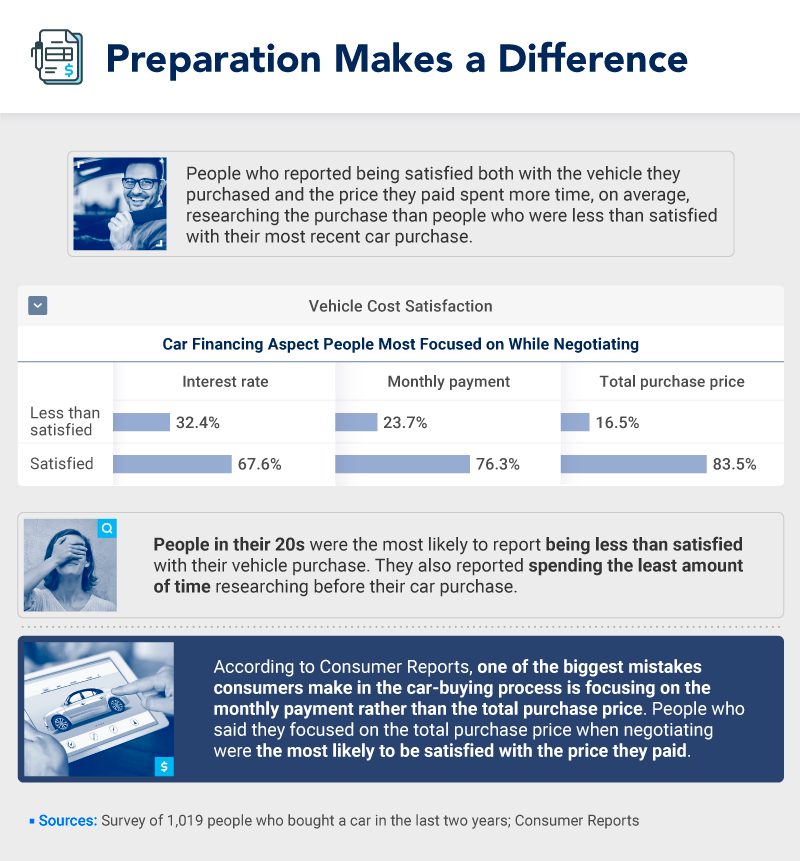It's Easier Here.
Leith Cars Blog

Benjamin Franklin once said, “By failing to prepare, you are preparing to fail.” What he couldn’t have known, however, was how perfectly the world of car buying supports his theory.
After surveying over 1,000 people who had purchased a car in the last two years, we know how important preparatory research is to the car-buying process. We started our study by asking people how they prepared to cross such a major financial milestone and what factors they researched before buying. What were their negotiation strategies? And how satisfied were they with the car they drove home? Ultimately, buying a car is not the time to wing it, so read on to learn how to better prepare yourself for the purchase.
Most Influential Car Factors

We sought to understand what Americans value the most when purchasing a car. Each respondent was allowed to pick just one thing that mattered the most to them.
Cost was the most important factor, by far, for all age groups when researching a car. Considering the average U.S. car ran a monthly tab of $523 in 2018, it makes sense that cost is factored in so heavily. Things like vehicle history, maintenance or repair costs, and size paled in comparison to the weight of dollars and cents. But this was even more true for respondents aged 40 and older, who chose cost significantly more often than their younger car-buying counterparts. The oldest respondents are likely the most experienced at car buying, so their concern for cost could be coming from that experience. Moreover, your 30s – not your 40s – are thought to be your most expensive years, again reinforcing that 40-somethings’ concern for cost may come from experience rather than financial necessity.
However, younger participants were more likely to rate gas mileage as the most important factor when looking to buy. This may indicate their increasing involvement with environmentalism and concern for the planet.
Researching Your Ride

Research on cost, safety, and other car factors takes time, especially if you want to do it right. People were asked which aspects of cars and the car-buying process they researched, as well as how long it typically took them to find all the information they wanted.
In total, it took an average of nearly three hours for respondents to feel they had sufficiently researched their future car. Additionally, our data showed that people who chose to finance their most recent car purchase through a traditional auto loan spent 42 minutes more researching than people who bought a car outright and an average of 54 minutes more than people who leased a vehicle. Financing through a traditional car loan is heavily linked with credit scores and requires more planning, which may necessitate additional time to become knowledgeable before putting pen to paper.
Mostly, research time was spent on the very same thing participants said mattered most when buying a car: cost. This was the only factor to be researched by more than three-quarters of respondents. While many financial experts would agree that cost is certainly important to research, your desired cost may depend on the condition of the car. If you’re interested in a new car, you should be seeking the “invoice price” of the car. This is the price the dealership paid for the car, which can help you negotiate knowledgeably. If, however, you’re looking to purchase a used car, you’ll want to spend your time researching the recent resale prices for the model that interests you.
Preparing Your Pockets

Research wasn’t the only way to prepare; purchasers’ finances had to be in order, as well. It typically took respondents an average of 6.4 months to financially prepare for their car purchase.
Negotiating the price of a vehicle looked a little different based on whether people decided to buy new or used vehicles. People who chose to buy a used vehicle were more likely (49.5%) to say they focused on the total purchase price of the car when negotiating compared to people who bought new (33.9%). A majority of people who bought new cars reported focusing on the monthly payment they would be expected to pay.
According to financial experts, it is essential to make sure you are negotiating the final price of the car, commonly called the “drive-away” or “out-the-door” price. It’s a good idea to be upfront and tell the seller that you are only willing to negotiate a price that includes all fees, sales tax, and other costs you may have to pay.
Another major tip in price negotiations is getting preapproved for a car loan if you are financing. By getting approved sooner rather than later, you can focus your research based on how much you can borrow. It can also save heartache by avoiding any attachments to vehicles that are out of your price range. Knowing your borrowing ceiling can also make you a stronger negotiator. Still, 44.3% of respondents did not take this crucial first step.
The Value of Preparedness

Bearing in mind that every respondent had purchased a car in the last two years, we separated participants into two groups: those who were satisfied with their car purchase and those who were less than satisfied. We also looked at satisfaction with the price they paid. We then compared satisfaction with the amount of time they spent researching, as well as how their negotiating styles played a role.
Preparation appears to make a difference. The people who reported being satisfied with both the vehicle they purchased and the price they paid spent the most time researching it beforehand, with an average of 3.1 hours compared to just 1.9 hours of research conducted by people who were less than satisfied.
Experience and age came in handy again, as those in their 20s reported being less than satisfied with the vehicle they purchased. Recall this was the group who reported spending the least amount of time researching.
Negotiation tactics also played a huge role in how satisfied respondents were with their vehicles. Nearly 84% of people who focused on the final price of the vehicle during negotiations were satisfied with their purchase, compared to 76% of people who focused on the monthly cost and less than 68% of people who focused on the interest rate.
Car Buying 101
As our research shows, people learn with age (and research!) how to buy a car that suits their needs and budget. And if there is anything at all that we can do to accelerate that learning, LeithCars.com is here for it.
LeithCars.com works hard to provide studies like this, as well as a platform for people to make knowledgeable decisions during the car-buying process. There’s a world of research available that we want to help distill so that people of all ages can buy a car they’re happy with. Head to LeithCars.com to start learning about your perfect vehicle.
Methodology
We surveyed 1,019 people who had purchased a car in the last two years. All respondents were instructed to answer the survey based on their most recent car-buying experience.
Respondents were 49.1% men and 50.9% women. An additional four respondents identified as nonbinary. The average age of respondents was 36.7 with a standard deviation of 11.8.
People were asked which factor of the car-buying process was most important to them. They could only select one answer. However, when asked about aspects of the car-buying purchase they spent time researching, they were able to select all options that applied to them. Because of that, percentages won’t add to 100 for that data.
All averages presented in the project were calculated to exclude outliers. This was done by finding the initial average and multiplying it by three. That product was added to the initial average. Anything above that new sum was then excluded as an outlier.
When respondents were asked what they chose to focus on when negotiating their car purchase, 115 reported they did not finance their most recent car purchase. These people were not included in the analysis of this variable.
Respondents were asked to rate how satisfied they were with both the vehicle they purchased and the price they paid for the vehicle. They were given the following scale of options:
- Extremely dissatisfied
- Dissatisfied
- Somewhat dissatisfied
- Neither dissatisfied nor satisfied
- Somewhat satisfied
- Satisfied
- Extremely satisfied
In our final visualization of the data, options were consolidated into two groups. Respondents answering extremely dissatisfied, dissatisfied, somewhat dissatisfied, and neither dissatisfied nor satisfied were grouped and labeled as less than satisfied. Somewhat satisfied, satisfied, and extremely satisfied were grouped and labeled as satisfied.
Limitations
The data we are presenting rely on self-reporting. There are many issues with self-reported data. These issues include, but are not limited to, selective memory, telescoping, attribution, and exaggeration.
Fair Use Statement
Buying a car is a major purchase that requires a lot of research and planning. If you know someone who would benefit from the information in this project, please share for any noncommercial reuse. We ask that you link back here so that people can view the entire project and its methodology. This also gives credit to our contributors whose efforts made this project possible.
More from my site








